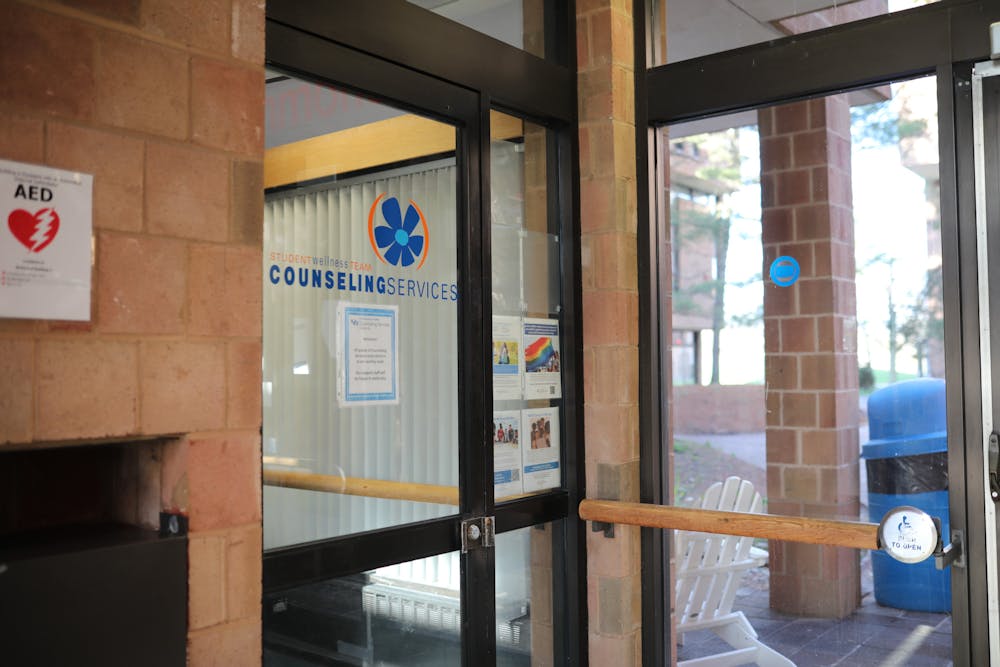92% of students in crisis see a UB counselor the same day they request an appointment. But students who need further assistance encounter a difficult dilemma: attend the UB program’s biweekly individual counseling sessions — capped at 10 appointments every academic year — or navigate the complexities of health insurance to secure stable, long-term care off campus.
Students who need more than 10 sessions, or who require medication immediately, have to consider off-campus resources. UB Counseling can only prescribe medication after a psychiatric evaluation from a UB counselor — but students cannot get a psychiatric evaluation during their first appointment.
In these situations, UB Counseling can make referrals to outside providers, such as BestSelf Behavioral Health, Horizon Health Services and the ECMC Help Center.
But students have to use their own health insurance to pay for those resources.
This begins a tedious navigation of weighing finances with medication. UB currently has no programs tailored specifically for uninsured students or students who encounter an emotional risk in accessing their guardians’ insurance.
Medication prices vary depending on the brand and type of diagnosis — and Lisa Graziano, a psychiatric mental health nurse practitioner with UB Counseling, says she always considers patients’ finances when prescribing medication.
“I always keep in mind my population. Students don’t have a lot of extra money,” Graziano said. “There are particular medications that are very effective, that are very cost appropriate. They’re easy enough to afford monthly if they are uninsured.”
As UB drops its health insurance mandate and the university-sponsored health insurance plan beginning in fall 2024, the balance of costs becomes increasingly imperative for the small number of students who depend on it.
“That’s one of the first things I ask when we get to the medication portion after the assessment,” Graziano said. “What is your insurance? Do you know what it covers? Do you have medication coverage, so that we can talk about how you’re going to afford it… Some medications go from $0 to $1,000 a month.”
Students who choose to stay on campus reap few long-term benefits, given that UB Counseling only specializes in short-term crisis management.
UB Counseling Services attributes its 10-session limit to a rise in demand for services and the limited number of counselors. In the 2022-23 academic year, 2,114 students attended 12,185 counseling appointments, according to UB Counseling’s executive summary. That averages out to 5.76 appointments per patient. The numbers reflect a 6% decrease in the number of students seen and 7.5% decrease in appointments — decreases UB Counseling Services attributes to two blizzards and staff shortages.
To better meet students’ needs, UB is investing $1 million to hire seven new counselors, who will be “embedded” in individual academic units. UB Counseling Services director Andrea Greenwood says the additional counselors will ensure UB always meets students’ most urgent needs.
“In addition to the same-day needs assessment model of accessing services, we want to assure UB students that there is NEVER any wait to access crisis support in a mental health emergency,” Greenwood wrote in an email to The Spectrum.
“I think students are aware of the resources we have on campus,” Frankie Kraft, a licensed clinical social worker and Out of Darkness Walk organizer, said. “We really stress the availability of crisis resources on campus.”
But students, like senior neuroscience major and vice president of UB Pre-Physician Assistant Society Elandra Polanco-Noble, often still don’t see the impact or even know such resources exist.
“I didn’t know there was any mental health [resources]. I know they put it on the internet but really no one’s looking at that,” Polanco-Noble said.
Polanco-Noble says UB’s administration ignores its role in causing mental health issues..
“Saying, ‘We want you to be stressed because you’re taking so many classes, but we want you to have mental health’ is a little hypocritical. Then give us less work. Then I won’t be so stressed,” Polanco-Noble said. “They’re going to say the things I already know, like, ‘Get some more sleep,’ or ‘Look at your mental health,’ when it’s really just all the workload that I have.”
Even during these conversations surrounding mental health, the events have a tendency to sound cliché. Nina Lvov, a freshman neuroscience major, says that while she trusts UB Counseling staff, she is frustrated with what she sees as a platitudinous response from UB.
“I feel like they just say stuff. Sometimes they’re just like, ‘Oh, mental health is important’ — like all schools do,” Nina Lvov, a freshman neuroscience major, said. “I feel like they don’t actually care.”
If you or someone you know is dealing with a mental health emergency, call University Police immediately at 716-645-2222, or 911 from off campus. If you are stressed or in need of someone to talk to, contact UB Counseling Services at 716-645-2720. If you are in a crisis situation, contact Crisis Services of Western New York’s 24/7 hotline at 716-834-3131. Students can also text the Crisis Text Line by sending “GOT5” to 741-741.
Matthew D. Dowd contributed to the reporting of this article.
Mylien Lai is an assistant arts editor and can be reached at mylien.lai@ubspectrum.com

Mylien Lai is the senior news editor at The Spectrum. Outside of getting lost in Buffalo, she enjoys practicing the piano and being a bean plant mom. She can be found at @my_my_my_myliennnn on Instagram.





